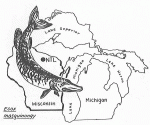North Temperate Lakes (NTL) LTER is entering its second decade of long-term ecological research. Although many of the major goals for the next decade are similar to those of the past 10 years, most have evolved to encompass broader spatial and temporal points of view.
Within the synthetic goal of understanding the ecological complexity generated by multiple processes acting over many temporal and spatial scales, broad-scale evaluations of factors controlling lake processes are being developed. These include:
- Perception of long-term trends in physical, chemical and biological properties of lake ecosystems
- Understanding of dynamics of internal and external processes affecting lake dynamics
- Analyses of temporal responses of lake ecosystems to disturbance and stress evaluation of interactions between spatial heterogeneity and temporal variability of lake ecosystems
- Expansion of the understanding of lake-ecosystem properties to a broader, regional context.
The Northern Highland Lake District in northcentral Wisconsin provides the abundance and diversity of lakes necessary for such multi-scaled research.
Groundwater Scales
One of the most robust results in NTL’s first decade of research is the recognition of the important role groundwater plays in providing the hydrologic and geochemical context of the lake district. To date, research has focused on understanding the role groundwater plays in individual lakes. In the next decade we will expand the spatial scale to develop a spatially-explicit, regional hydrologic model that will be driven by weather- related parameters. If successful, the model will allow the prediction of water levels and solute loading in lakes throughout the lake district as a function of weather. Thus far researchers have quantified the degree to which lakes behave similarly to each other through time.
Findings show, for example, that lakes tend to behave similarly with respect to water levels, but independently with respect to a wide assortment of chemical and biological parameters. The temporal coherence of lakes with respect to water levels makes NTL researchers optimistic that they can successfully model hydrologic processes affecting lakes on a regional scale.
The temporal scale of NTL groundwater observations from years and decades has been expanded to millenia using the record stored in lake sediments. Analysis of fossil sponge spicules reveals a dramatic, but gradual, long-term decline in silica concentration in lakes throughout the lake district. Causes of the decline are not fully understood, but may involve differential weathering of silicate tills during the Holocene. This result adds to the mounting evidence that systems are rarely in equilibrium, even when averaged over long time periods.
Intersite Spatial Analysis
The next major intersite research project will initiate comparisons of landscape structure of diverse sites using remotely sensed data to control for the spatial extent and grain of the data sets. Findings show grain of observation is important; for example, the area perceived to be covered by lakes in the lake district drops to half when the grain of observation is changed from 30-meter to 1-kilometer grids.
The remote sensing workshop at the LTER All Scientists Meeting this September will provide a first step for intersite interests in this area.
Personnel
In keeping with NTL’s increasing attention to broader spatial and temporal scales, two forest ecologists have joined its research group; Tom Gower as a principal investigator and Mark D. MacKenzie as an assistant researcher with Geographic Information Systems (GIS) expertise.
John Magnuson intends to take a sabbatical in the fall of 1991, to conduct intersite research on spatial heterogeneity and patchiness of different LTER sites at a hierarchy of spatial scales.
For more information contact John J. Magnuson, Center for Limnology, University of Wisconsin-Madison, 680 N Park Street, Madison WI 53706, or Timothy K. Kratz Trout Lake Station, 10810 County Highway North, Boulder Junction WI 54512.

 Enlarge this image
Enlarge this image
